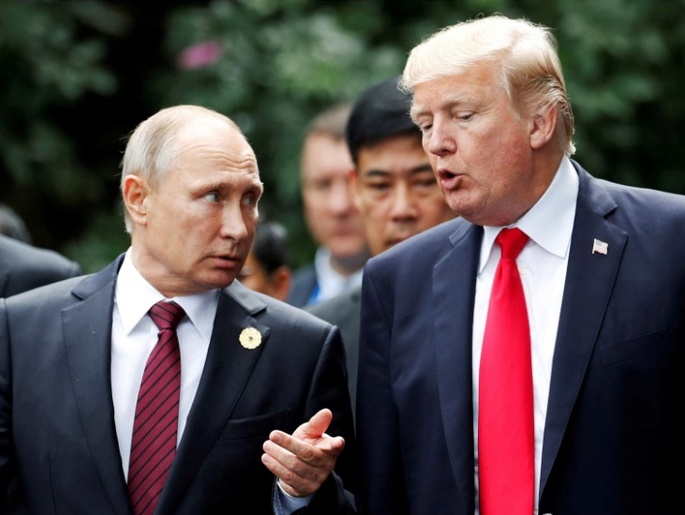SAEDNEWS: On the eve of a sensitive dialogue between Donald Trump and Vladimir Putin, European leaders issued a warning tone calling for increased economic, political, and military pressure on Russia; an action aimed at preserving a united Western stance and preventing any agreement that disregards Ukraine’s interests.

According to Saed News, quoting Reuters, just days before the controversial meeting between the former U.S. president and the Russian president, European capitals have mobilized to present a united and strong position against the Kremlin. Senior officials from the European Union and key NATO countries have collectively emphasized the necessity of intensifying pressure on Moscow, with the goal that any possible negotiations between Trump and Putin do not produce outcomes contrary to the West’s overarching policies regarding the war in Ukraine.

These statements clearly indicate Europe’s concern about possible scenarios arising from the Trump-Putin meeting. Past experience and Trump’s relatively close relationship with Putin have led some European leaders to fear that the former U.S. president, if inclined toward a “quick agreement,” might retreat from the current tough stances against Russia. These concerns are especially acute in Eastern European countries, which face direct security threats from Russia.
Leaders from countries such as Poland, Lithuania, Latvia, and Estonia have explicitly declared that any retreat from the policy of maximum pressure on Moscow would have dangerous consequences for Europe’s security. They warned that any agreement involving territorial concessions of occupied Ukrainian lands would not only legitimize Russian actions but also set a dangerous precedent for other border disputes worldwide.
On the other hand, major Western European countries such as France and Germany—albeit with a more diplomatic tone—have stressed the need to maintain Western unity. Emmanuel Macron and Olaf Scholz, in separate statements, declared that the war’s end must be based on the principles of the United Nations Charter and Ukraine’s territorial integrity. They also emphasized the importance of preserving and strengthening economic sanctions against Russia and continuing military aid to Kyiv.
According to European diplomats, the main objective of this wave of statements is to send a direct message to both negotiating parties—Trump and Putin. Europe wants to clarify its red lines in advance so that in any potential agreement, Ukraine’s interests and the continent’s security are not ignored. This stance also sends a message to public opinion and transatlantic allies that the European Union remains resolute against Russian aggression.
Meanwhile, Kyiv has welcomed the positions of its European allies and views them as a sign of a strong anti-Russian front. Volodymyr Zelensky, Ukraine’s president, emphasized in a televised interview that any reduction of pressure on Moscow will only prolong the war and increase human casualties. He also warned that the Kremlin seeks to exploit any divisions or disagreements among Western allies to advance its objectives.
Analysts believe that Europe’s emphasis on increased pressure on Russia is more than just a symbolic stance; it is an effort to manage the negotiation atmosphere ahead. In practice, these pressures could include new sanctions packages, broader restrictions on sensitive technology exports to Russia, and even increased NATO military presence in Ukraine’s neighboring countries.
However, some experts warn that excessive pressure without a clear diplomatic pathway might push Russia toward harder positions. This group argues that alongside pressure, effective dialogue channels must be maintained to allow for a sustainable agreement. But in the current European atmosphere, where memories of war are still fresh in the heart of the continent, such views are less welcomed.
From Moscow’s perspective, these European positions are seen as part of the “West’s hostile approach.” The Kremlin has repeatedly stated that sanctions and military pressures will neither change Russia’s stance nor weaken its resolve on the current path. Russian state media have also tried to portray these statements as signs of Europe’s dependency on Washington’s policies and its lack of autonomy in major security decisions.
Nonetheless, Europe’s relative unity at this moment holds great importance. Internal disagreements over economic issues, energy, and migration have often weakened the cohesion of the European Union in recent years. But the war in Ukraine and its associated threats have largely placed these countries on a common front. The main challenge for European leaders now is to maintain this unity in the face of the likely Trump-Putin meeting.
Ultimately, Europe’s message is clear: pressure on Moscow must continue until Russia respects fundamental principles of international law and recognizes Ukraine’s territorial integrity. Whether this message will influence the content of the Trump-Putin negotiations depends on the political will of the parties and Europe’s ability to translate its positions into practical actions. But at least for now, European leaders want to ensure that no backdoor agreement will be made without their presence and consent.

